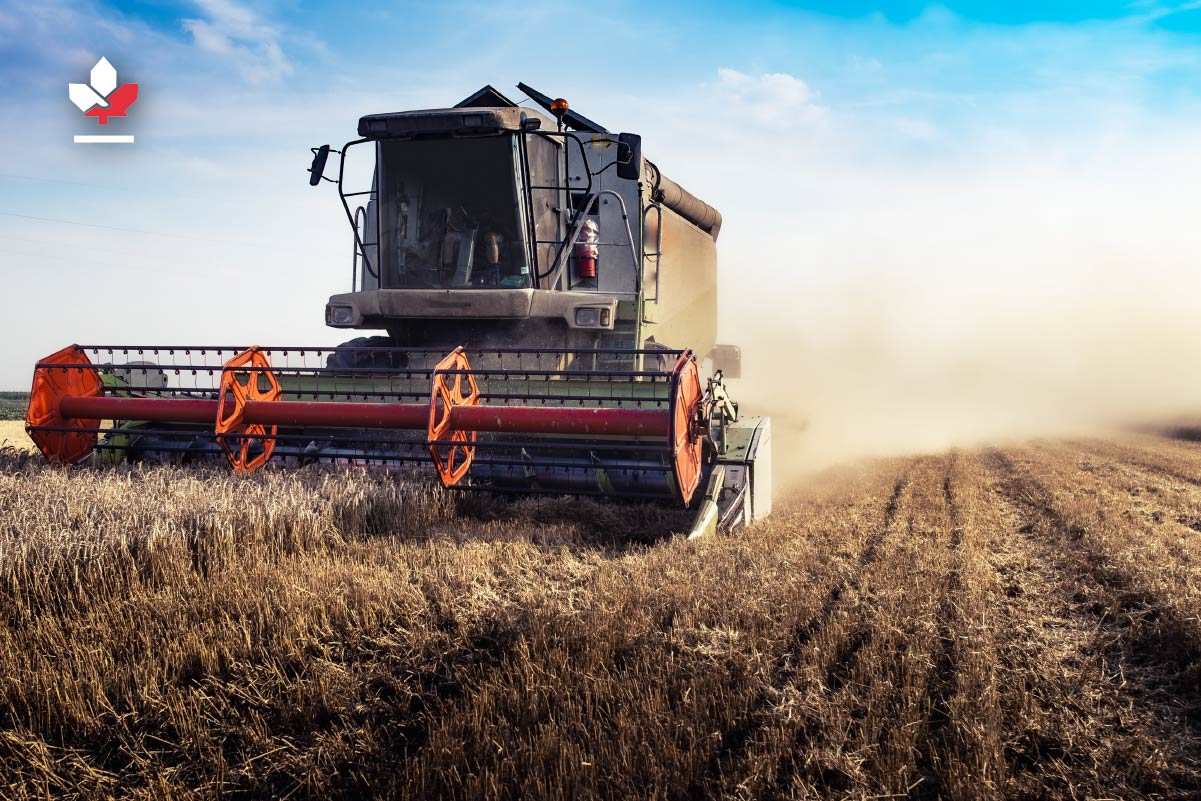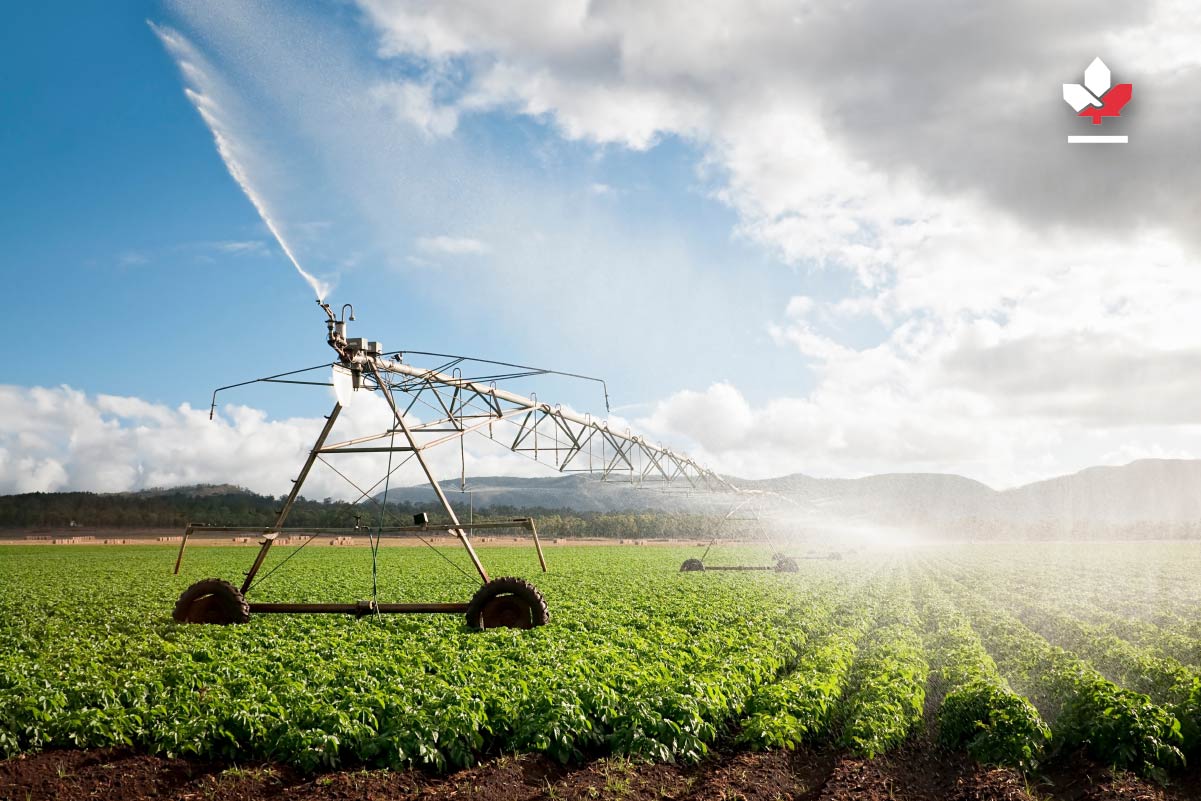The Top Agriculture Jobs in Canada
July 24, 2024
|
If you are passionate about sustainable farming, agricultural technology, or food security, Canada offers many opportunities in its vibrant agricultural sector. From the large prairies of the west to the fruitful orchards of the east, agriculture plays a crucial role in Canada's economy and global food production. Each position contributes to Canada's agricultural output and creates innovation and sustainability in farming practices.
Ready to find out what Canada's top agricultural jobs are? Then, check out some of the top agricultural jobs in Canada below.
Top Agricultural Sectors in Canada

Canada consistently ranks among the world's leading exporters of agricultural products. Take a look into the five of Canada's top agricultural sectors.
Grains and Oilseeds
This sector reigns supreme, accounting for a substantial share of agricultural income. Canada is one of the world’s largest producers of Canola, a type of grapeseed. This versatile crop is processed into canola oil for cooking and industrial uses, while meals left over from processing become valuable high-protein livestock feed.
Wheat, barley, oats, and flaxseed are other key players in this sector, with Canada ranking among the top global producers of each. These grains are used for human consumption, e.g., for bread, pasta, cereals, and animal feed. The vast, fertile plains of Canada's prairie provinces, such as Alberta, Saskatchewan, and Manitoba, provide ideal conditions for growing these crops, making Canada a major player in the global grain trade.
Red Meat and Livestock
Canada boasts a thriving red meat and livestock sector, with beef cattle ranching a prominent feature in the Prairies. These expansive grasslands offer excellent grazing land for cattle, contributing to Canada's position as a major beef exporter.
Provinces like Ontario and Quebec have a strong dairy industry, with dairy farms raising cattle for milk production. Milk is then processed into cheese, yogurt, butter, and ice cream. Hog production is another significant contributor to this sector, with pork being a popular meat choice in Canada and a valuable export commodity.
Dairy
Canada's dairy industry is a well-established tradition, supplying Canadians with high-quality dairy products for generations. Dairy farms are scattered across the country, with Quebec being a notable producer. Strict regulations ensure the humane treatment of animals and the safety and quality of milk and its derivatives. Canadian dairy products are known for their taste and quality, contributing to their popularity in the domestic market and export success.
Horticulture
Canada's diverse climate allows for a flourishing horticulture sector encompassing various fruits, vegetables, greenhouse production, and floriculture (flowers). British Columbia, Ontario, and Quebec are major horticulture producers, with greenhouses enabling year-round production of certain crops in some areas.
Canadian greenhouses utilize innovative technologies to maximize yield and minimize environmental impact. The horticulture sector caters to domestic consumption and export, providing fresh, high-quality produce to Canadians and international markets.
Poultry And Eggs
Poultry and eggs are essential components of the Canadian diet, with chicken being the most popular poultry meat. The production of turkeys is also significant, particularly around Thanksgiving and Christmas holidays. Egg production is another critical aspect of this sector, with modern chicken farms utilizing efficient methods to ensure a steady supply of fresh eggs.
Poultry farms are found across Canada, concentrating in provinces with strong feed grain production, as grains form a major part of poultry feed. The poultry and egg sector is vital in meeting domestic demand for affordable, high-protein food sources.
Top Agriculture Jobs in Each Major Sector Canada
Here are some top jobs in each significant sector to consider when joining the agricultural workforce, with National Occupational Classification (NOC) codes and annual average salaries from Canada’s Job Bank.
Grains and Oilseeds
Here are some of the top jobs in Canada’s grains and oilseeds agricultural sector.
| Jobs | NOC Code | Annual Average Salary (CAD) |
|---|---|---|
| Agricultural Consultant | 21112 | 95,677.79 |
| Agricultural Equipment Technician | 72401 | 94,126.99 |
| Grain Buyer | 12102 | 92,775.25 |
| Crop Farm Supervisor | 82030 | 58,282.28 |
| Grain Farm Worker | 85101 | 44,372.54 |
Red Meat and Livestock
Here are some of Canada's top red meat and livestock sector jobs.
| Jobs | NOC Code | Annual Average Salary (CAD) |
|---|---|---|
| Veterinarian | 31103 | 135,726.02 |
| Meat Processing Supervisor | 92012 | 74,483.44 |
| Animal Breeder | 80020 | 65,824.60 |
| Ranch Manager | 80020 | 65,820.78 |
| Livestock Farm Worker | 85100 | 50,014.15 |
Dairy
Take a look below for the top dairy jobs in Canada.
| Jobs | NOC Code | Annual Average Salary (CAD) |
|---|---|---|
| Dairy Nutrition Consultant | 31121 | 107,533.53 |
| Dairy Processing Technician | 22110 | 72,584.61 |
| Dairy Farm Manager | 80020 | 65,811.00 |
| Dairy Herdsperson | 84120 | 53,769.69 |
| Dairy Farm Worker | 85100 | 50,009.98 |
Horticulture
Below are the top horticultural jobs in Canada.
| Jobs | NOC Code | Annual Average Salary (CAD) |
|---|---|---|
| Horticultural Consultant | 22114 | 69,898.32 |
| Landscape Gardener | 22114 | 69,892.74 |
| Arborist | 22114 | 69,892.23 |
| Horticultural Technician | 22114 | 69,891.98 |
| Nursery and Greenhouse Worker | 85103 | 48,387.28 |
Poultry And Eggs
Here are the top jobs in Canada’s poultry and eggs industry.
| Jobs | NOC Code | Annual Average Salary (CAD) |
|---|---|---|
| Poultry Veterinarian | 31103 | 135,687.63 |
| Hatchery Manager | 80020 | 65,800.97 |
| Poultry Farm Manager | 80020 | 65,798.35 |
| Poultry Farm Worker | 85100 | 49,995.84 |
| Egg Grader and Packer | 85100 | 49,995.11 |
How Can I Work in Canada’s Agricultural Sector?

Canada's thriving agricultural sector offers exciting opportunities for domestic and international individuals seeking fulfilling careers. You must get a Canada work permit to work in Canada’s top agricultural jobs.
Canada Work Permit
The Canada Work Permit is a document issued by Immigration, Refugees and Citizenship Canada (IRCC) that allows foreign nationals to work in Canada for a specific employer and period. For agricultural roles, Canadian employers must typically obtain a Labour Market Impact Assessment (LMIA) from Employment and Social Development Canada (ESDC), demonstrating a need for foreign workers due to a need for more available Canadians. With a positive LMIA, you can apply for a Canada work permit as a skilled foreign worker using the following visa options.
Agriculture Worker Stream
The Agriculture Worker Stream falls under Canada's Temporary Foreign Worker Program (TFWP) and targets non-seasonal agricultural positions. Employers must show a sustained need for foreign workers and provide appropriate working conditions and wages per Canadian standards. Workers interested in this stream must secure a job offer from an employer with an approved LMIA and meet health and security criteria.
Seasonal Agricultural Worker Program
The Seasonal Agricultural Worker Program (SAWP) caters to seasonal labor needs in agriculture, enabling employers to hire workers from Mexico and participating Caribbean countries for up to 8 months annually. This program aims to fill temporary positions such as planting, harvesting, and farm maintenance. Workers under SAWP must have agricultural experience, undergo medical exams, and comply with Canadian employment laws.
Learn more about how you can work in Canada.
What Are Some Benefits of Working in Agriculture in Canada?

Canada's agricultural sector offers more than wide-open fields and fresh produce. Here are some key reasons to consider joining the agricultural workforce.
Technological Advancements
Canadian agriculture isn't stuck in the past. The industry embraces innovation, with cutting-edge techniques like precision agriculture leading the way. This involves using drones, GPS technology, and data analysis to optimize yields and resource management. Working in this environment allows you to be at the forefront of these advancements, shaping the future of food production.
Learn more about the emerging tech cities in Canada you can settle in.
Contribution to Food Security
Canada is a global leader in agriculture, crucial in ensuring food security for millions. By working in this sector, you become part of the solution to global food challenges. From growing crops that nourish communities to implementing sustainable practices, your contribution has a real and positive impact.
Learn how to start a successful food truck business in Canada in eight easy steps and contribute to Canada’s food security.
Support for Rural Communities
Agricultural jobs are the lifeblood of many rural communities across Canada. Choosing a career in agriculture strengthens these communities by providing economic stability and supporting local businesses. You will be contributing to a vibrant and close-knit environment where your work directly impacts the well-being of your neighbors.
Learn more about why you should move to Canada.
Environmental Stewardship
Sustainability is a cornerstone value in Canadian agriculture. Many farms adopt soil conservation techniques and integrated pest management to minimize their ecological impact. Working in this sector allows you to be part of the movement towards a more sustainable food system, ensuring a healthy environment for future generations.
Learn the five reasons you should move to environmentally friendly Canada.
Networking and Collaboration
The agricultural industry fosters a strong sense of community. Working with farmers, researchers, and agricultural professionals provides collaboration and knowledge-sharing opportunities. This network can be a valuable resource for professional development and career advancement.
FAQs
What Skills Are Important for Success in Canadian Agriculture Jobs?
Success in Canadian agriculture jobs hinges on skills like crop management, livestock handling, proficiency in agricultural technology, problem-solving abilities, and effective communication to navigate diverse challenges and ensure sustainable production.
What Are the Current Trends in Canadian Agriculture Employment?
Current trends in Canadian agriculture employment include integrating digital technologies for precision farming, a growing emphasis on sustainable agricultural practices to minimize environmental impact, and increasing demand for skilled professionals in agribusiness management and agricultural research.
Where Can I Find Job Listings for Agriculture Positions in Canada?
Job listings for agriculture positions in Canada can be found on specialized job boards like AgCareers.com, through industry associations such as the Canadian Agricultural Human Resource Council (CAHRC), government portals like Job Bank, and by networking with professionals in the agricultural sector.
How Can I Permanently Immigrate to Canada as an Agricultural Worker?
There are several pathways to permanent residency in Canada for agricultural workers. The Agri-Food Immigration Pilot is a dedicated program for experienced, non-seasonal workers in specific agricultural occupations. Additionally, Provincial Nominee Programs (PNPs) often have streams for in-demand agricultural workers. Lastly, the Rural and Northern Immigration Pilot (RNIP) provides a Canadian permanent residence pathway to select rural communities where farm workers are in demand.
